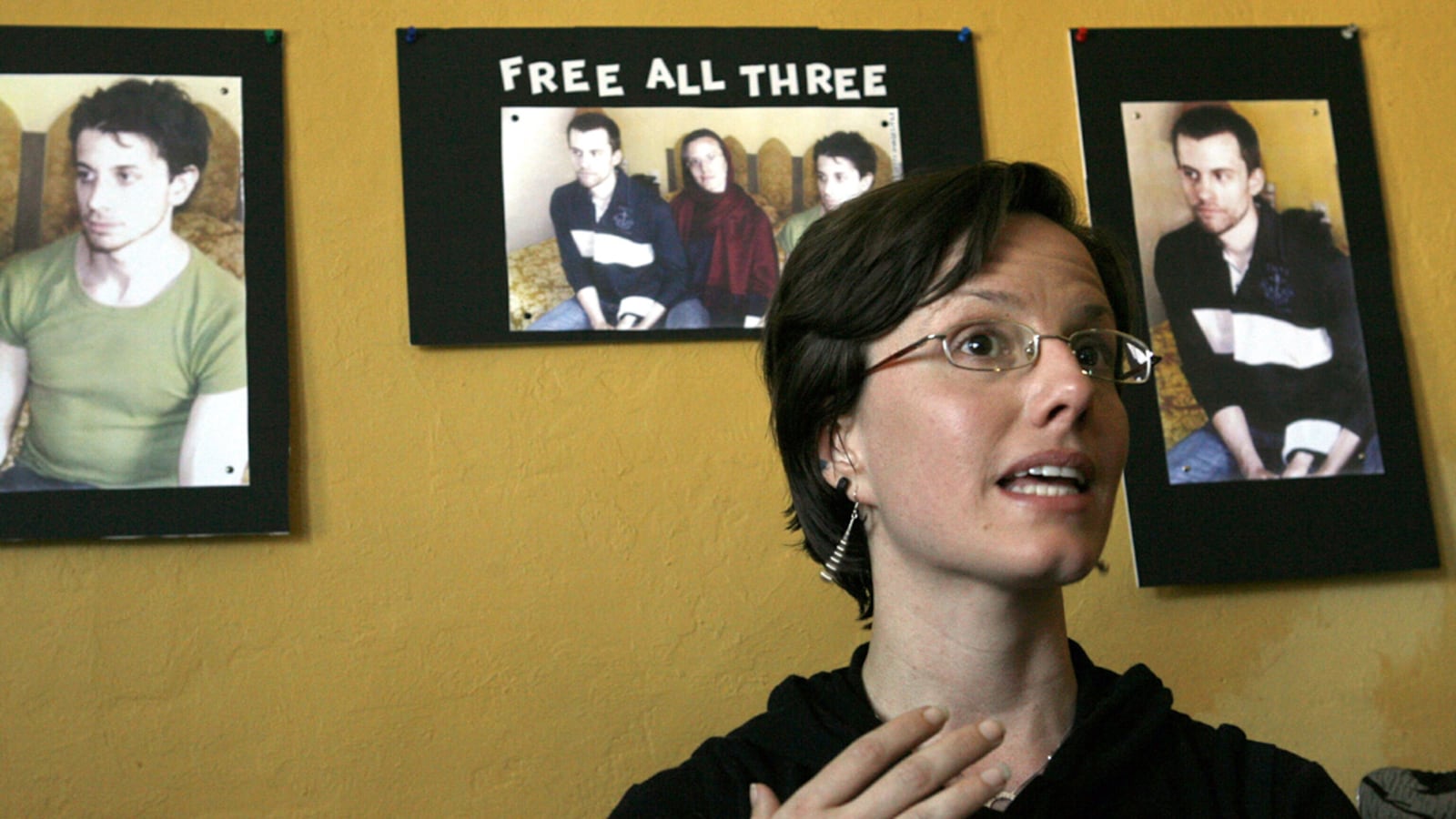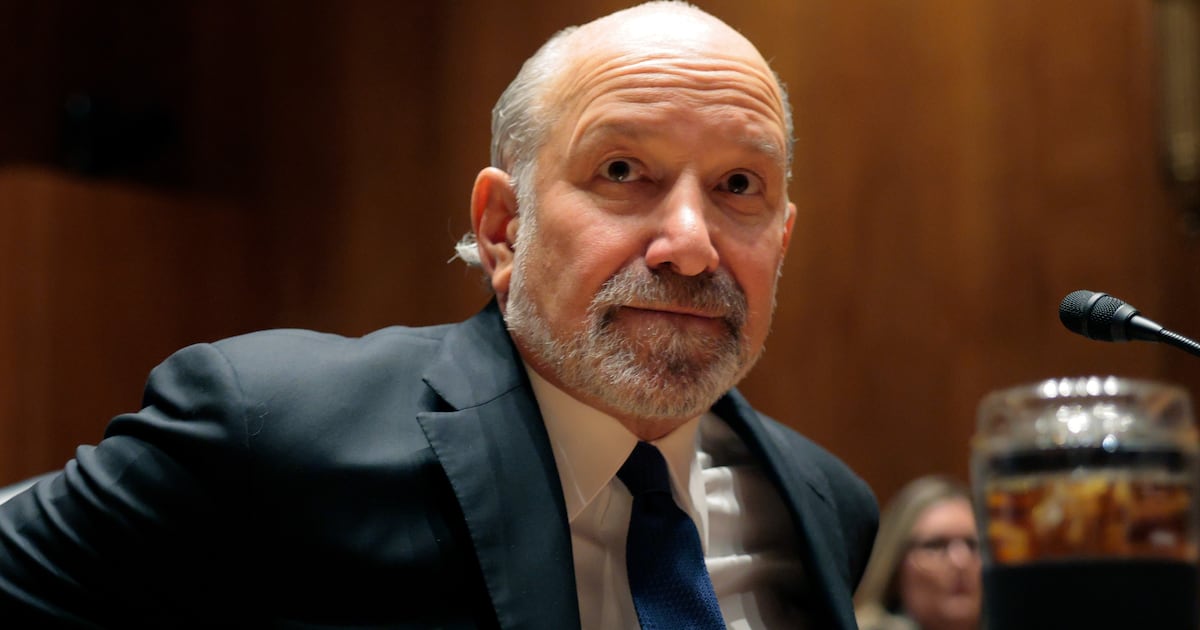When I came out of Iran’s Evin prison 14 months ago, one of the first things I did was thank the individuals who were responsible for holding me hostage, having accused me of crossing Iran’s border on a hike in 2009. “My gratitude goes in particular to Ayatollah Khomeini and President Ahmadinejad for my compassionate release from detention,” I said, standing behind a podium at a press conference crammed with journalists in New York City. I knew that in the absence of such a statement, my friend Josh Fattal and my fiance Shane Bauer, who had been taken prisoner with me, might never be set free.
I assumed I would be widely criticized for my statement of gratitude toward the Iranian government (some observers suggested I had Stockholm Syndrome), but I was mistaken. Iranians around the globe have been especially supportive, sending me hundreds of notes. In one recent message on Facebook, an Iranian woman told me, “Sarah, watching you on TV thanking Ahmadinejad and Khomeini last year, I saw clearly the traces of pain and mental pressure on your young face. Also, I knew you being out with your friends still kept in a cell, you were trapped in a contradictory, paradoxical situation.”
The flood of Facebook messages I’ve received from Iranian people since I was released 14 months ago came as somewhat of a surprise at first. In fact, Iranians have been one of our biggest grouping of online support throughout the campaign to “Free the Hikers”. Iranian-Americans have offered us vital support through advice, translation and blogging. Pro-democracy student groups have organized demonstrations and held campus events. When I get stopped in the street or at the airport by a sympathetic, “Sarah, is that YOU?” it is usually an Iranian-American, often with tears in his or her eyes, apologizing for the Iranian government’s actions.
Now that I know more about Iran, it makes perfect sense. Iranians understand what we went through better than anyone else. Their government is rapidly devolving into a neo-totalitarian regime that uses random arrests, assassinations, show trials, and executions to manipulate, silence dissent, and set an example. Many have experienced first-hand having a loved one, neighbor, or friend plucked out of their lives, imprisoned and even killed, sometimes for something as small as writing a blog.

The incredible thing for me was that so many Iranians worldwide took the time to care about us despite the thousands of other political prisoners they have to worry about. “I’m an Iranian boy ashamed for what our government did to three American hikers,” another message on Facebook says. “I want you to know Iranian people are with you and against their own government. Iran’s regime is not chosen by Iranian people. They kill and torture us and we are all in a very big prison named Iran.”
I did not intentionally walk across an unmarked border into a country whose language I didn’t speak and history I’d never studied. Nor did I choose the most interesting and volatile time in the Islamic Republic’s 31-year history to be captured, imprisoned, and psychologically tortured by the government. But it happened. Like a lot of the world, I was just beginning to wake up and pay attention to Iran in the weeks leading up to my captivity. The post-election protests were all over the news, and I was intrigued by what felt like a new breed of a nonviolent mass movement, with powerful use of imagery, props, and tactics. Call it fate or call it coincidence, even though I never intended to go anywhere near Iran, I found myself thrown into a small cell in Evin prison, while the Green Movement was raging in the streets.
Iran’s movement for democracy, freedom, and human rights did not spring out of nothing after the disputed elections of 2009. It has been a slow, burning fire in the hearts of Iranians for decades, some say since Iran’s first democratically elected prime minister, Mohammed Mossadegh, was deposed by a CIA-orchestrated coup in 1953. Others attribute the birth of the movement to 1979, when the Shah was overthrown by popular uprising and an Islamic Republic emerged with power concentrated in the “Supreme Leader.” Iranians are extraordinarily cognizant of their own history, and they don’t want to repeat it by installing another U.S. puppet like the Shah; nor can they continue to tolerate rampant human-rights abuses and despotism in the name of Islam. The millions of people who took to the streets after the disputed 2009 elections want to get outside of history. They are seeking a third, nonbinary way, based on a common vision instead of a common enemy. For 31 years, “Death to America” has been chanted in the streets of Tehran. In 2009 a new cry, “Death to No One,” was born.
The halls of Evin prison were filled with political prisoners. Even though I was kept in solitary confinement and carefully watched by guards, I caught countless glimpses of other women detainees. Sometimes they smiled at me from under the crack of their blindfolds as they were being led by my cell. Being held hostage during the zenith of this popular movement’s resistance and the Iranian government’s subsequently brutal response made me envy these prisoners because they were being held for a purpose. It made me want to participate in undermining the regime that was causing me and my family so much pain. I heard their powerful voices standing up to the guards down the hall. I heard their songs and defiant laughter, I heard their tears and I even heard their screams. There was nothing I could do for them then, but now that I am free, I will never forget my Iranian sisters in Section 209.
The irony that has often been pointed out is that Shane, Josh and I, as journalists, activists, and educators, are the type of Americans that the Iranian government supports and even celebrates in rhetoric. The reason I moved to the Middle East was because I wanted to do solidarity work with Palestinian and Iraqi refugees, a choice that stemmed from my long-term opposition to the wars in Iraq and Afghanistan and the Israeli Occupation of Palestine. President Ahmadinejad appears to pride himself on making a clear distinction between American people and their government, celebrating Americans like Rachel Corrie, whose life was taken after she stood up to an Israeli tank about to demolish a Palestinian home in 2003. Rachel’s life and sacrifice was recently acknowledged by having a street in Tehran named in her honor.
So, why would a supposed anti-imperialist government take three innocent Americans hostage, punishing them for the exact same policies of their government that they themselves have spent their lives criticizing? The answer is simple, they couldn’t care less what we think about Palestine or Iraq! The only thing that mattered was our passports from Iran’s arch-enemy, the U.S. State Department, and the sinister fact that they could make the unsubstantiated claim of illegal entry across an unmarked border. Shane, Josh, and I were the only ones that could contradict their claims, and they had us safely locked away under incommunicado detention, with no means to object.
Now that our campaign has finally been successful, and Josh, Shane, and I are free, unlike most Iranians I’m am lucky to be able to criticize the Iranian government without any apprehension or dread of reprisal. I also have the liberty to criticize the policies of my own government that I believe contribute to maintaining the dead-end relationship of hostility between the U.S. and Iran.
One such recent example is the proposed Iran Threat Reduction Act of 2011 (H.R. 1905). If this bipartisan bill passes, I will make it all but illegal for any representative of the U.S. government to so much as talk to his or her counterpart in the Iranian government. The only exception being a proven “unusual and extraordinary threat to the vital national security interests of the United States.” In that case, Congress must be informed by the President 15 days prior to any effort to engage.
This would be the first time in history that Congress could prevent the White House or State Department from negotiating with any other country. It would outlaw low-level discussions between Washington and Iran (the only type that has proven effective) on its controversial nuclear program, cooperation against the Taliban and combating drug smuggling in Afghanistan.
If this bill had been in effect last year, it’s very possible that my friends and I would still be in Iranian prison. Had there been effective diplomacy, on the other hand, we might never have been there as much as the 15 days of notice this bill requires. Requiring approval from Congress means it would not only cause a delay that could derail any talks about situations like ours, but the bill also presents a serious risk that the talks could be leaked, thereby rendering the “quiet” aspect of diplomacy out of the question. Perhaps the most morbid thing about this bill is that it seeks to discourage diplomacy that is already nearly nonexistent. Recently, Barbara Slavin, a journalist and author who specializes on Iran, asserted that the Obama administration has spent as little as 45 minutes in direct talks with Iran. How can Congress outlaw diplomacy with Iran when it hasn’t even been tried yet?
In the absence of diplomacy, the slow march toward military conflict with Iran continues unabated. Another area in which U.S. foreign policy toward the Iranian people is (at best) inconsistent is sanctions. I have nothing against sanctions that target specific Iranian officials for human-rights violations, freezing their foreign assets and baring them from travel. To my satisfaction, the very same judge that sentenced Shane and Josh to eight years in prison, Salavati, was blacklisted in this manner. On the other hand, broad economic sanctions such as the new round recently unanimously approved by the U.S. Senate have the adverse effect of not only targeting the country’s oil industry, but of raising the prices of basic goods and therefore hitting the poorest of Iranians the hardest.
Iranian people are currently reeling from the aftermath of the most brutal repression since 1979; they don’t need added economic pressure from us. How can the U.S. government say it supports the struggle for democracy and human rights in Iran but be punishing the Iranian people with sanctions at the same time? These types of policies are in fact tone deaf to history. At best, they keep us stuck where we’ve been for 31 years, and at worst, they serve to actually strengthen the platform of Ahmadinejad and other hardliners, drowning out the opposition with the nationalist rallying cry against outside aggression.
Though the movement for democracy in Iran has been largely dormant over the last two years, the extreme paranoia of the Iranian government and the brutal repression it continues to exact are the best indications that the opposition itself is still going strong. Resistance has been subsumed into smaller acts, like young people of both sexes gathering in parks for illegal water-gun fights and artists anonymously publishing scathing critiques of the regime, such as the recent graphic novel Zahra’s Paradise. Until the right spark comes along (and it could be anything), the movement will continue to grow and regain its strength underground.
Every time the Iranian government does something as blatantly unjust as taking innocent hostages, it has expanded the international support for the opposition. It’s good that our story brought attention to this brutal regime, and hopefully aided in speeding its downfall, but victory in Iran must be homegrown, not as a result of our government or any other government interfering. Sadeq Rahimi commented that for many of us with friends and relatives in Iran, our liberation was an encouraging and pleasant step in a thousand-mile journey to freedom and openness in that country.
Perhaps it wasn’t dishonest of me to thank the Iranian government 16 months ago, but now I can be more specific. Thank you for using us to further deepen your own crisis of legitimacy around the world and with your own people. Thank you for laying bare your total disregard for justice, fairness, and human liberty. Thank you for taking my voice away so that it could be that much stronger when, thanks to my family and friends, I got it back. Thank you for giving me the opportunity to highlight that what you did to me and my friends, you continue to do to thousands. “You three people,” a recent message from an anonymous Iranian on Facebook said, “are one paper in the history of Iran.” May the next page bring us all closer to freedom.






